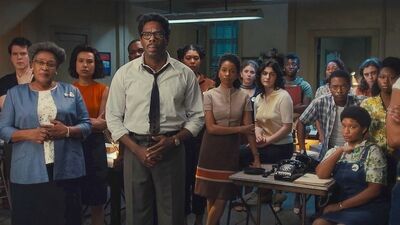The opening of “Rustin” quotes the unconstitutionality of segregation and then slides through a slow-motion montage of instantly identifiable chapters in the movement: Ruby Bridges, guarded from the front and back, walking to school in 1960 as the first Black student to be integrated in Louisiana; Elizabeth Eckford being berated on her way to class in 1957, surrounded by hateful schoolmates; and Anne Moody, stoic during her 1963 sit-in at a diner as food is being thrown on her in protest from the white people inside. It’s a somewhat melodramatic montage included only as evidence that racism existed outside of legislation. And though these historic moments are essential, their cliched inclusion is just as surface-level as the entirety of Wolfe’s film.
“Rustin” tends to present cliches as discourse but succeeds better at detailing events leading up to the march and showcasing its hero as a whole person. Domingo, who collaborated with Wolfe in 2020’s “Ma Rainey’s Black Bottom,” is excellent as Rustin. He’s charismatic, gritty when he needs to be, and wildly intelligent. Co-writers Dustin Lance Black and Julian Breece provide a witty script, and Domingo executes its humor flawlessly. There are plenty of laughs that break up some of the more touching moments, but unfortunately, the passing comedic lines far outshine those meant to leave an emotional impact. Where the humor succeeds, the film’s pathos falters.
Rustin’s friendship with Martin Luther King Jr. (Aml Ameen) is a central part of the story, as is his intermittent romantic relationship with a younger activist, Tom (Gus Halper). Both men have excellent chemistry with Domingo, holding their own while also functioning to give the movie a nuanced lead. His budding romance with Elias Taylor (Johnny Ramey), a fictionalized pastor on the NAACP board, is another key relationship in the emotional construction of Rustin. Rustin isn’t treated solely as an activist, considered only for the lines on his resume, but as a man with touchy friendships, hurt feelings, and charm to a fault. However, it also often teeters into melodrama, jumping from one item on the script’s outline to the next.

